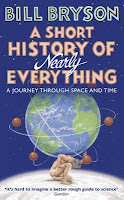 ★★☆☆☆
★★☆☆☆I had high hopes for this book. As most readers of this blog will know, I've read a lot of Young Adult dystopia -- it's my favourite genre. I kept hearing people talk about the original big dystopias and how masterful they are so I was expecting them to knock the Young Adult books out of the park but alas, no.
This book reads, to be honest, like a proposal much more than a novel. Huxley sets up a very different world, brought about after anthrax and war devastated the planet, where citizens are grown in tubes rather than born, and grown into different classes -- the elite Alphas and Alpha-Pluses, the pretty intelligent Betas, the labourer Gammas and Deltas and the Epsilon Semi-Morons who do the most menial jobs. Babies come from Hatcheries where the different classes are specially grown -- for example, the lower classes have alcohol poured into their embryo jars to stunt their growth. Embryos for the lower classes are bokanovskified, meaning dozens and dozens of them are made with the same DNA, and when out of the tubes they don the same uniforms and look identical.
Babies are then conditioned to be happy with their class using hypnopaedia and other psychological tricks, like electric shock aversion "therapy". Hypnopaedia is a huge conditioning tool. While the infants sleep, sentences like "I'm so glad I'm a Beta. Alphas have to work so hard and are always stressed" about every aspect of life are whispered over the intercom thousands of times until they're drilled into their heads. They're conditioned to seek only pleasure and never think, and the society prizes consumerism to the extent that no new sport can be invented unless it uses at least as much equipment as another sport. Ford is venerated as a god. Children are strongly encouraged into "erotic play" with each other. People take soma constantly, a happy drug that's described as having the escapist effects of alcohol without the hangover the next day. The rulers of the society take great pains to emphasise that this society is stable, and everyone's happy now.
The worldbuilding is really interesting, though honestly I don't find it particularly believable. Even though they're engineering the babies and conditioning them via hypnopaedia and giving them soma, I feel like statistically someone would have done something because rebellion isn't put down by force. But Huxley doesn't seem to have thought about or dealt with that much at all.
Here's why it just seemed like a proposal for a world rather than a novel: there's no story.
Nothing changes in the society. We just get told what it's like the whole way and there is no character or world development.
I'm not sure who we're supposed to consider the main character, a whiny Alpha who complains about a vague feeling of discomfort the society gives him or the boy from the savage reservations who only appears 100 pages in and doesn't actually change the society (or anything really) at all.
This was where I especially missed my YA dystopias. In YA, the characters always do something. Maybe it's that teenage feeling of invulnerability, but they always at least try to change the world rather than saying hm I have a bad feeling about this and ignoring it.
Another point to YA is that -- in the ones I've read -- we get into the characters' heads and discover the world as they do. At first they often think their world is perfect but they gradually uncover its dirty secrets and we share in that dawning horror. We get to see how the world responds when they interfere with it whereas we don't see that here because no one ever makes a dent in the society or even tries. We didn't get to explore the world ourselves at all -- the book is just entirely exposition. Now, I love worldbuilding, but it turns out that a plot and decent characters are important.
The book is also annoying stylistically -- this could just be because it's old but for example there were several pages where about four different characters were talking and they were all just jumbled up on different lines, not saying who was saying what at all.
Finally, the ending is really abrupt and unexplained and it really just seems like Huxley wanted to present his idea for a world and didn't want to have to deal with resolving characters.
Overall, the main problem is that the book just doesn't really have a plot. There are no stakes, because they're never presented as being in any danger. I guess we're supposed to be chilled by the idea that people could become so docile from soma and a world based entirely around fulfilling their base desires that they wouldn't need threats/danger/stakes but I'm afraid I needed a bit more from a novel. Like a plot. The details of the world are very interesting but not very believable and you can get them from reading a summary so I can't really recommend Brave New World.
























































